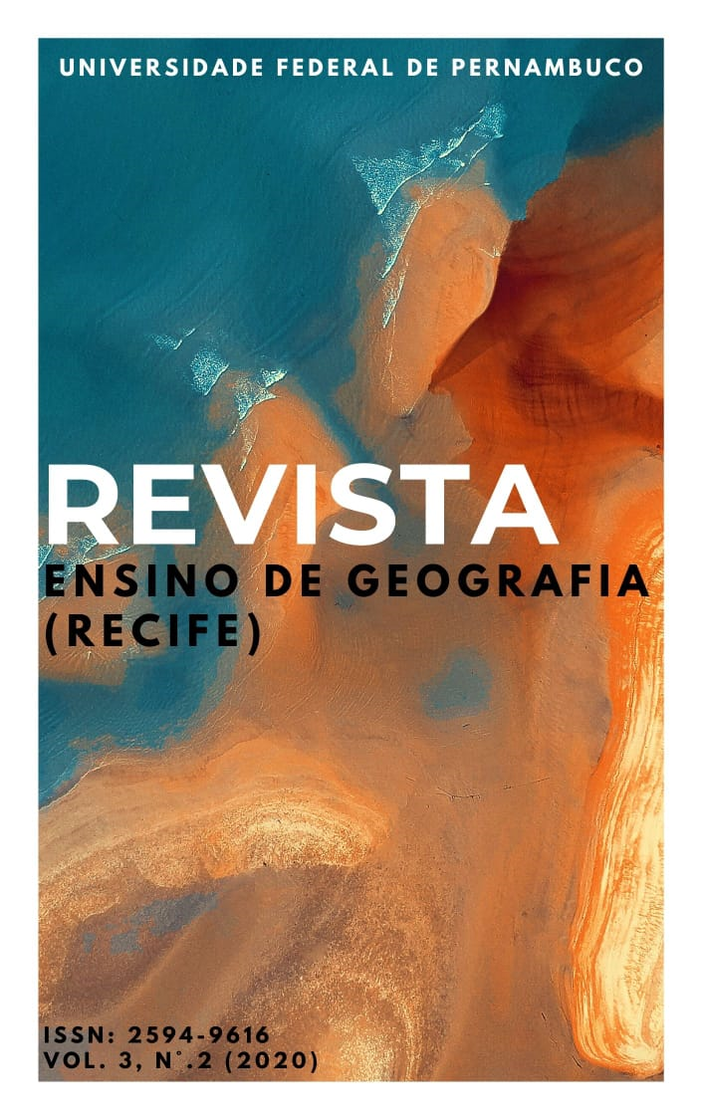Between limits and possibilities of school geography
DOI:
https://doi.org/10.51359/2594-9616.2020.243768Keywords:
Ensino de Geografia, Formação Cidadã, Geografia Escolar.Abstract
Faced with the transformations of contemporary geographical space, reflecting on the world is an increasingly complex and necessary task. Geography has a fundamental role, as it enables such discussions in the school environment, through geographical knowledge, thus contributing to the citizen's formation. The aim of this text is to reflect on the potential of school geography for citizen formation, as well as to indicate the limits that must be overcome. This article is the result of reflections from a literature review on the subject, whose objective is to reflect on the potential of school geography for citizen formation. The ideas discussed here refer to a bibliography of critical theoretical-methodological matrix that seeks to analyze the contradictions and possibilities of geography in the context of Brazilian education.
References
BECKER, B. K; EGLER, C. A. G. Brasil: uma nova potência regional na economia-mundo. 2. ed. Rio de Janeiro: Bertrand Brasil, 1994.
CALLAI, H. A Geografia e a escola: muda a geografia? Muda o ensino? In: Terra Livre. São Paulo. n. 16. 2001, p. 133-152.
CALLAI, H. C. Aprendendo a ler o mundo: a geografia nos anos iniciais do ensino fundamental. In: Caderno Cedes. Campinas, vol. 25, n. 66, 2005, p.227-247.
GOOSDSON, I. F. A construção social do currículo. Lisboa: Educa, 1997.
HAESBAERT, R. O mito da desterritorialização: do “fim dos territórios” à multiterritorialidade. Rio de Janeiro: Bertrand Brasil, 2004.
HARLEY, B. Mapas, saber e poder. In: Confins [Online], n. 5, 2009. Disponível em: http://journals.openedition.org/confins/5724, acesso em 01/04/2019.
KAERCHER, N. A. O gato comeu a geografia crítica? Alguns obstáculos a superar no ensino-aprendizagem de geografia. In: PONTUSCHKA, N. N; OLIVEIRA, A. U (orgs). Geografia em perspectiva. 4. ed. São Paulo: Contexto, 2013, p. 221-231.
LACOSTE, Y. A Geografia - isso serve, em primeiro lugar para fazer a guerra. Campinas: Papirus, 1988.
LOJKINE, J. O Estado capitalista e a questão urbana. 2. Ed. São Paulo: Martins Fontes, 1997.
PONTUSCHKA, N.N; PAGANELLI, I. T; CACETE, N. H. Para ensinar e aprender geografia. 3. ed. São Paulo: Cortez, 2009.
RICHTER, D. Raciocínio geográfico e mapas mentais: a leitura espacial do cotidiano por alunos do ensino médio. Presidente Prudente: Universidade Estadual Paulista. 320 f. Tese (Doutorado em Geografia), 2010.
ROCHA, G. O. R. Uma breve história da formação do(a) professor(a) de Geografia no Brasil. In: Revista Terra Livre. São Paulo, n. 15, 2000, p. 129-144
SANTOS, Milton. Por uma outra globalização: do pensamento único à consciência universal. 10. ed. Rio de Janeiro: Record, 2003.
SANTOS, M. O espaço do cidadão e outras reflexões. Porto Alegre: Fundação Ulisses Guimarães, 2011.
SILVA, Alcinéia de Souza; SOBRINHO, Hugo de Carvalho; LEITE, Cristina Maria Costa. Análise crítico-reflexiva da reforma do ensino médio: o ensino de geografia em questão In: Revista de Ensino de Geografia, Uberlândia, v. 8, n.14, p.128-140, 2017.
STRAFORINI, R. Ensinar geografia nas séries iniciais: o desafio da totalidade mundo. Dissertação (mestrado em Geografia). UNICAMP. Instituto de Geociências. 150 f. Campinas: s.n., 2001.
VESENTINI, J. W. A formação do professor de geografia – algumas reflexões. In: PONTUSCHKA, N. N; OLIVEIRA, A. U (orgs). Geografia em perspectiva. 4. ed. São Paulo: Contexto, 2013, p. 235-240.
Downloads
Published
How to Cite
Issue
Section
License
Copyright (c) 2021 Dayana Aparecida Marques Oliveira Cruz

This work is licensed under a Creative Commons Attribution 4.0 International License.
Authors who publish with this journal agree to the following terms:- Authors retain copyright and grant the REVISTA ENSINO DE GEOGRAFIA (RECIFE) right of first publication with the work simultaneously licensed under a Creative Commons Attribution NonCommercial International 4.0 (CC BY-NC) that allows others to share the work with an acknowledgement of the work's authorship and initial publication in this journal.
- Authors are able to enter into separate, additional contractual arrangements for the non-exclusive distribution of the journal's published version of the work (e.g., post it to an institutional repository or publish it in a book), with an acknowledgement of its initial publication in this journal.
- Authors are permitted and encouraged to post their work online (e.g., in institutional repositories or on their website) prior to and during the submission process, as it can lead to productive exchanges, as well as earlier and greater citation of published work.



